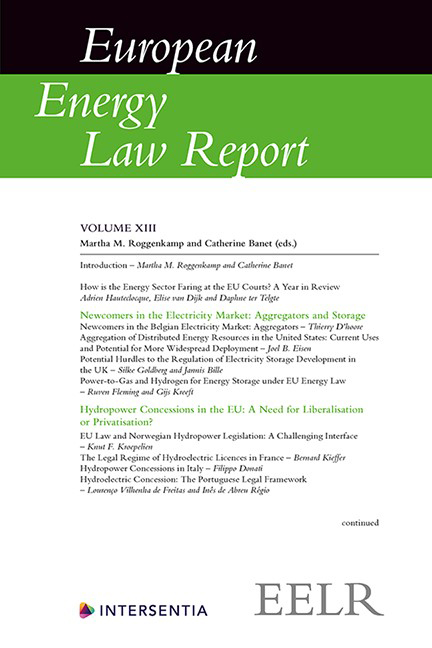Book contents
- Frontmatter
- Preface
- Contents
- List of Abbreviations
- List of Contributors
- Introduction
- Chapter I How is the Energy Sector Faring at the EU Courts? A Year in Review
- PART I NEWCOMERS IN THE ELECTRICITY MARKET: AGGREGATORS AND STORAGE
- PART II HYDROPOWER CONCESSIONS IN THE EU: A NEED FOR LIBERALISATION OR PRIVATISATION?
- PART III INVESTMENTS AND DISINVESTMENTS IN THE ENERGY SECTOR
- PART IV OFFSHORE DECOMMISSIONING IN THE NORTH SEA
- PART V CCS AS A CLIMATE TOOL: NORTH SEA PRACTICE
- PART VI FROM EU CLIMATE GOALS TO NATIONAL CLIMATE LAWS
Chapter IV - Potential Hurdles to the Regulation of Electricity Storage Development in the UK
Published online by Cambridge University Press: 30 April 2020
- Frontmatter
- Preface
- Contents
- List of Abbreviations
- List of Contributors
- Introduction
- Chapter I How is the Energy Sector Faring at the EU Courts? A Year in Review
- PART I NEWCOMERS IN THE ELECTRICITY MARKET: AGGREGATORS AND STORAGE
- PART II HYDROPOWER CONCESSIONS IN THE EU: A NEED FOR LIBERALISATION OR PRIVATISATION?
- PART III INVESTMENTS AND DISINVESTMENTS IN THE ENERGY SECTOR
- PART IV OFFSHORE DECOMMISSIONING IN THE NORTH SEA
- PART V CCS AS A CLIMATE TOOL: NORTH SEA PRACTICE
- PART VI FROM EU CLIMATE GOALS TO NATIONAL CLIMATE LAWS
Summary
INTRODUCTION
The energy sector is rapidly evolving – new market participants, an increasing share of renewably generated electricity as part of our energy mix and the increasing importance of data in the sector are but a few examples. As the industry moves generally in the direction of decentralisation (i.e., the increased tendency towards embedded generation connected to distribution grids only, without connection to the central transmission grid, and off-grid or private wire projects), digitation (via smart meters) and decarbonisation (via the slow phase-out of fossil fuels and the increase of renewable energy sources), the technological challenge for grid operators has grown. Until recently, the industrial-size storage of electricity was thought to be the stuff of science fiction rather than a possible solution to current challenges of the electricity grid.
This is not surprising as the development of more financially viable, efficient and reliable electricity storage (hereafter only referred to as “storage”) is indeed so recent that in the Overarching National Policy Statement for Energy, published in July 2011 by the Department of Energy and Climate Change, storage was only mentioned once. Since then, however, it has become clear that storage will be increasingly relevant for the future outlook of the UK's energy system. Underlining this trend, the Carbon Trust, a UK-based organisation advocating a transition to a low carbon energy future, found that the deployment of storage in the UK “could significantly reduce the cost of a future UK electricity system” and “could save £2.4 billion a year by 2030”, but identified regulatory barriers as one key hurdle for such deployment. Furthermore, National Grid identified storage as a central technology for any future energy scenarios in the UK.
Recognising that the UK energy system was changing and that the regulatory environment had to adapt to the deployment and development of new smart technologies, Ofgem and the UK Government published a call for evidence in November 2016, seeking views and evidence relating to existing policy and regulatory barriers to the development of smart technologies including storage. The response was published in July 2017 and was followed up by further consultation on the topic, including Ofgem's Smart Systems and Flexibility Plan. Furthermore, Ofgem began to look more specifically into the effective deployment of storage in the UK electricity system.
- Type
- Chapter
- Information
- European Energy Law Report XIII , pp. 79 - 100Publisher: IntersentiaPrint publication year: 2020

